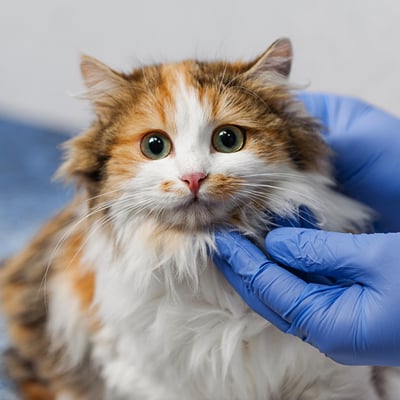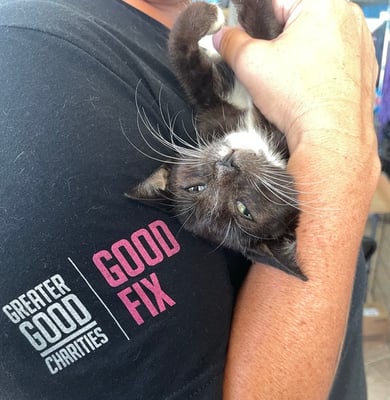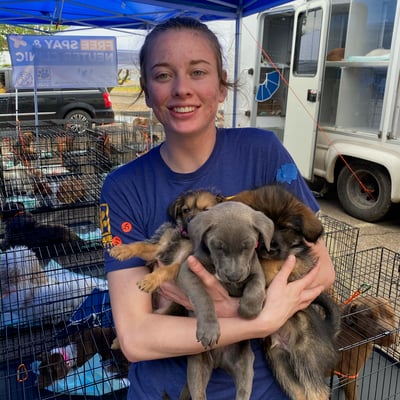4 Reasons Spay and Neuter Programs Are Vital for Every Community
Pet overpopulation is a serious issue in the U.S. and across the world. Unchecked dog and cat breeding and the resulting litters has a variety of residual effects on our communities. Spaying and Neutering is an easy way that pet owners can be part of the pet overpopulation solution as well as help their own pets live healthy lives.
Here’s why spaying and neutering is an important part of caring for both owned and homeless pets:
Lessens the Burden on Animal Shelters
The biggest benefit to spaying and neutering, of course, is that it prevents unwanted litters, which can place a tremendous burden on animal shelters when these puppies and kittens are brought to them as strays. The issue isn’t limited to free roaming dogs and cats, but includes owned pets as well. Some owners may believe they can control their pets’ breeding opportunities but it’s simply not always the case, resulting in unplanned pregnancies. Intact males can mate without their owners ever knowing about it; it only takes a small window of opportunity.

Keeps Free Roaming Pet Population in Check
With an estimated up to 70 million stray cats and 1.6 million stray dogs in the U.S., many of these animals live on the streets their entire lives. This scenario perpetuates the growth of the free roaming pet population and unwanted litters. Stray dogs and cats live hard lives; they are vulnerable to starvation, disease, abuse by unkind humans, accidents, injuries and more. Keeping these populations under control is the most humane way to care for these animals.
Many communities have implemented a TNR program (Trap, Neuter, Return) in which stray pets (most often cats) are trapped, taken to a clinic for spay/neuter surgery, and then returned back to their community because many of these pets, despite the dangers on the street, would not be happy living as a household pet. Greater Good Charities’ Good Fix program partners with animal welfare organizations across the nation to hold high volume, high quality spay and neuter clinics to help both free roaming and owned pets. .
Protects Pets from Health Issues
Spaying your female pet lessens her risk of certain health problems like uterine infections and breast cancer, while neutering your male pet reduces his chances of developing testicular cancer and benign prostatic hyperplasia (enlarged prostate gland). Intact dogs and cats also have a strong instinct to roam which increases their chance of escaping from your home or yard and puts them at risk for many dangers including diseases, accidents, and, sadly, cruelty by humans.
 .
.
Reduces Undesirable Behaviors
Intact males and females exhibit natural behavior associated with mating, including the desire to roam outside, yowling, frantic behavior, and more in female pets and, in male pets, urine marking and potentially aggressive behavior towards other males. Your intact female dog or cat will inevitably attract male attention and your intact male pet will always be on the lookout for a mate. This can cause a lot of stress and worry for pet owners. Unfortunately, in some instances, these behaviors can lead an owner to relinquish or abandon their “bad” pet. On the flip side, many pet owners report their pets as being much calmer and content after spay/neuter surgery.

Spaying or neutering your pet is a significant way that you can make a big impact on a societal challenge that affects both animals and humans. Check out our Good Fix page to learn more about the importance of spay and neuter programs and how we're bringing these vital clinics to communities across the country!
Donate now to support this vital program.
Did You Know?
- There are many low cost or no cost options for spay/neuter surgeries, including Greater Good Charities’ Good Fix program, which partners with animal welfare organizations across the country to offer high-quality, high-volume spay/neuter clinics to community members.
- The life expectancy of spayed/neutered pets is up to 26% longer than that of intact pets. (Source: University of Georgia)
- It’s a myth that pets inevitably gain weight due to spay or neuter procedures. Keeping pets on a healthy diet and providing them plenty of exercise will keep them at their optimal weight.
- While spay/neuter surgeries are major surgeries, they are also the most common surgery performed by veterinarians.
- One non-spayed female cat or dog and her non-spayed offspring can produce approximately 11,000 – 13,000 kittens or puppies in just five years!
- An estimated 6.5 million dogs and cats enter shelters each year


